D.C. United
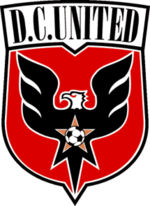 |
|||
| Full name | D.C. United | ||
|---|---|---|---|
| Nickname(s) | United, DCU, Black-and-Red | ||
| Founded | 1995 | ||
| Stadium | RFK Stadium Washington, D.C. (Capacity: 45,596) |
||
| Owner(s) | |||
| Head Coach | |||
| League | Major League Soccer | ||
| 2009 | Eastern Conference: 4th Overall: 10th Playoffs: DNQ |
||
|
|||
D.C. United is an American professional soccer club located in Washington, D.C. that participates in Major League Soccer, the United States' top-tier soccer league. The team's home field is the 45,596-seat Robert F. Kennedy Memorial Stadium, owned by the District of Columbia and located on the Anacostia River. The team has proposed building a new 24,000-seat soccer-specific stadium at multiple possible sites in the Washington metropolitan area.[1] The team is owned by the consortium D.C. United Holdings.
Considered the most successful club in Major League Soccer, D.C. United has won the U.S. Open Cup twice and holds the record for most MLS Cups and MLS Supporters' Shields with four apiece. D.C. United was the first club to win both the MLS Supporters' Shield and the MLS Cup back-to-back.[2] In 1998 D.C. United became the first American club to win the CONCACAF Champions' Cup and the Copa Interamericana.[3][4] Internationally, D.C. United has played in numerous CONCACAF competitions, including the recent 2008 CONCACAF Champions' Cup and 2008 SuperLiga. They are also the only US-based club to ever participate in a South American CONMEBOL competition, playing in the 2005 and 2007 editions of the Copa Sudamericana.
Players such as Jaime Moreno, Marco Etcheverry, and Ben Olsen are among the team's most successful stars. D.C. United has a strong fan base, with three supporters' clubs and one of the highest attendance averages in Major League Soccer.[5] The club's official nickname is the "Black-and-Red" and home uniforms are black and white with accents of red. The team's name alludes to the "United" appellation commonly found in the names of soccer teams in the United Kingdom and elsewhere.[6]
Contents |
History
Prior to the 1994 FIFA World Cup, the United States Soccer Federation fulfilled promises to FIFA by aiding in the foundation of a new professional league. On June 15, 1994, Major League Soccer selected Washington, D.C. out of twenty-two applicants to host one of the first seven teams, with three more added before the league's launch.[7] The team's name was chosen as a reflection of European team names such as Manchester United or Newcastle United. D.C. United however departs from the common British practice in which "United" may refer to a club formed by the union of two existing constituent clubs.[6]
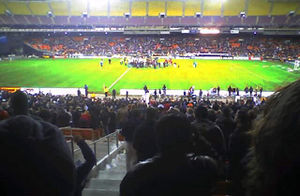
On April 6, 1996, D.C. United played in the league's inaugural match against the San Jose Clash in Spartan Stadium in San Jose, California.[7] In the league's early years, D.C. was the most successful of all the teams. Bruce Arena, the club's first coach, led the team to the first "double" in modern U.S. soccer history in 1996, beating the Los Angeles Galaxy to take the first MLS Cup and the USL First Division club the Rochester Raging Rhinos to win the U.S. Open Cup. D.C. repeated its MLS Cup victory in 1997 against the Colorado Rapids, with the match hosted at RFK Stadium. The team also saw early successes in CONCACAF competitions, winning both the Champions' Cup and the Interamerican Cup in 1998.[2]
In October 1998, Arena left the team to direct the U.S. men's national team. Arena's departure marked the beginning of a downturn in the team's fortunes.[8] While the club again won the MLS Cup in 1999 under coach Thomas Rongen, lackluster results in 2000 and 2001 led to Rongen's departure and his replacement by Ray Hudson in 2002. The team did not, however, fare much better under Hudson, and Piotr Nowak replaced him before the start of the 2004 season.[9] The club's first season under Nowak was marred by injuries in the early going, and some players were known to have complained about Nowak's methods.[10] Nevertheless a strong finish, assisted in large measure by the late-season acquisition of Argentine midfielder Christian Gómez, propelled United into the playoffs as the second seed. There they advanced past the New England Revolution on penalty kicks in what has been called one of the best games in MLS history.[11][12][13][14][15] United then defeated the Kansas City Wizards to take their fourth MLS Cup.[2]
On November 18, 2003, MLS made sports history by signing Freddy Adu, a 14-year-old soccer prodigy and on January 16, 2004 he was officially selected by United with the first pick in the 2004 MLS SuperDraft. When Adu entered United's regular-season opener as a second-half substitute on April 3, 2004, he became the youngest player in any professional sport in the United States since 1887.[16] On December 11, 2006, D.C. United traded Adu and goalkeeper Nick Rimando to Real Salt Lake in exchange for a major allocation, goalkeeper Jay Nolly, and future considerations.[17]
In 2005, the club made MLS history by becoming the first United States-based team to participate in Copa Sudamericana, entering in the Round of sixteen.[18] Since 2006, United has played well against international competition, beating Scottish champions Celtic F.C. and drawing Real Madrid in Seattle. In addition, the 2006 MLS All-Star Team, which included seven United players and was managed by United's manager Piotr Nowak, defeated English champions Chelsea.[9] Despite missing the MLS Playoffs in 2008 and 2009, D.C. United won the 2008 U.S. Open Cup and advanced to the final in 2009.
Colors and badge
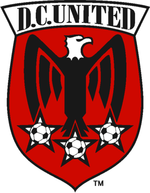
The teams colors and original logo were announced on October 17, 1995 along with those of the other ten original teams during a presentation in New York City.[7] Black and white are D.C. United's primary colors, though the team's nickname is the "Black-and-Red." Red is used to accent the home jersey while white is the main color of the team's away uniforms. Three stripes along the shoulder, in white at home and black on the road, represent the three jurisdictions of the Washington Metropolitan Area: Washington, D.C., Virginia, and Maryland. Before the team's current sponsorship deal with Volkswagen, three strips were also used on the front of the jerseys.[9] The team has also previously used white away uniforms with red stripes. White and red are the colors of the flag of Washington, D.C., and the stripes are also reminiscent of those used on the flag. Goalkeepers usually distinguish themselves with a red colored shirt.
The team's original shield was implemented in 1996 consisting of the team's name, D.C. United, above a black Bald Eagle facing right on a red field, clawing three soccer balls overlaid on three white stars. The three stars and balls were again intended to represent the region's three jurisdictions. The bird, associated with the federal government based in Washington, D.C., symbolizes many of the attributes of the team, including speed and power. The logo was redesigned before the 1998 season. The current design reoriented the eagle facing left, and removed the three stars below it, whose metaphor was retained by three raised wing feathers, similar to the stripes on the uniform. At the center of the eagle is a single gold colored star and soccer ball, which represents the team's victory in Major League Soccer's inaugural cup in 1996.[19] The logo can also be adorned with four gold stars above it, representing the MLS Cups the team has won.
Stadium

Robert F. Kennedy Memorial Stadium (RFK) has been home to D.C. United since the team's founding in 1996. RFK was built in 1961 as a dual use baseball and American football stadium. Prior to 1996, it periodically hosted soccer matches, including the 1980 Soccer Bowl, the 1993 Supercoppa Italiana, and five matches during the 1994 FIFA World Cup. When the Washington Nationals baseball team shared the field from 2005 to 2007, there were criticisms regarding problems with the playing surface and even the dimensions of the field.[20] The D.C. United Training Complex is located north of the stadium, and is where the Reserve Division team plays.[21]
In July 2006, D.C. United proposed building a new stadium along the Anacostia River as part of a redevelopment plan for Anacostia Park. However disputes with the city government about the proposal forced the team to consider other sites.[1][22] In February 2009, the team announced plans for a new stadium in nearby Prince George's County, Maryland close to FedEx Field. Dubbed the Prince George's County Soccer Stadium, this proposal ran into similar trouble when the County Council voted to send a letter to the Maryland General Assembly opposing the stadium plan.[23] Fear that the lack of a new stadium might cause the team to leave the Washington, D.C. area caused protests on May 9, 2009.[24]
On October 7, 2009, the Baltimore Sun reported that Baltimore mayor Sheila Dixon has asked the Maryland Stadium Authority to explore the possibility of building a 17,000- to 20,000-seat soccer stadium that could serve as D.C. United's permanent home, as well as host concerts, lacrosse games and other events, to woo D.C. United to Baltimore. The proposed stadium complex, according to Dixon's letter, would be part of a "green mixed-use project" with access to light rail, Interstates 95 and 295. A potential location mentioned for the stadium is in the 42-acre Westport Waterfront project.[25]; a feasibility study has been commissioned by the Maryland Stadium Authority and is expected to be released in September 2010[26].
Supporters and rivalries
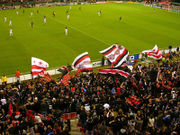
D.C. United has three major supporters groups, La Barra Brava, the Screaming Eagles, and La Norte. Each group has a designated section of the home stadium. La Barra Brava, Spanish for "The Brave Fans," was founded in 1995 by Latino fans in the Washington, D.C. area, mostly Bolivian immigrants in support of original United players Marco Etcheverry and Jaime Moreno. They seek to bring a South American style to home games.[27] The Screaming Eagles host public tailgates before home matches, and are known for singing during games.[28] La Norte, which takes its name from its location on the North side of the stadium, is noted for its streamers, large drum, and harassment of the opposition.[29]
D.C. United's primary rival is the New York Red Bulls, formerly known as the MetroStars. The two teams compete annually for the Atlantic Cup, a competition instituted by the two teams' management that goes to the team that gets the most points across the teams' meetings throughout the year. The Los Angeles Galaxy are the team's second rival, one with whom D.C. has jockeyed over the years to represent MLS as its signature franchise.[30] The teams, who met in the first MLS Cup, have the oldest rivalry in Major League Soccer.[31] D.C. United is also unique among MLS teams for its rivalry with the Charleston Battery of the United Soccer Leagues, as they compete every time they face one another for the Coffee Pot Cup, a trophy established by the two sides' supporters.[32]
Ownership and marketing
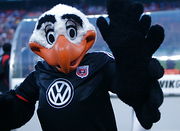
Billionaire investor George Soros was the primary financial backer and director of Washington Soccer L.P., the group that owned the operating rights to D.C. United when the league was founded in 1995.[33] Kevin Payne, former President of Soccer USA Partners and current CEO of D.C. United, was instrumental in organizing this ownership group. By 1998 the group was looking for new investors, and on February 15, 2001, it agreed to sell the team to Anschutz Entertainment Group (AEG), founded by Colorado billionaire Philip Anschutz, with AEG exercising its option to become the sole investor-operator on January 8, 2002.[7] AEG, who also own Major League Soccer's Los Angeles Galaxy and Houston Dynamo, ran the team until 2007.
On January 8, 2007, the operating rights to D.C. United were sold to D.C. United Holdings, a newly-formed group venture that included real estate developer Victor MacFarlane, founder of MacFarlane Partners, and William H.C. Chang, chairman of Westlake International Group. Other investors included D.C. United president Kevin Payne and Blue Devil Development, headed by former Duke basketball players Brian Davis and Christian Laettner.[34] In April 2009, Victor MacFarlane sold his share of the team to his partner William Chang after two stadium proposals had fallen through.[35] In October 2009, Chang also bought out Davis and Laettner to fully control the team.[36] Chang is also one of the primary investors of Major League Baseball's San Francisco Giants.[7]
Volkswagen Group of America, the American subsidiary of Volkswagen AG, is the jersey sponsor of D.C. United. Volkswagen agreed to pay over $14 million over five-years, beginning on May 6, 2008, putting the automotive company's logo on the front of the team jersey as well as other details. The deal is the second highest in MLS history.[37] As part of the sponsorship, Volkswagen will provide complimentary parking to the first fifty Volkswagens at every D.C. United home game. Other sponsors include Adidas, GEICO, Verizon Wireless, and Papa John's Pizza.[38] In May 2007, United entered into an initial one-year strategic partnership with Brazilian club Atlético Mineiro. The goal of the partnership is to enhance the sporting and commercial success of the respective clubs by sharing expertise and experience as well as creating new opportunities for the clubs in both areas.[39]
D.C. United are televised on Comcast SportsNet. Dave Johnson handles play by play, and former United coach Thomas Rongen does color commentary. Certain home matches are shown in High Definition on Comcast SportsNet HD. Select matches are also available on ESPN 2 and ESPN 2 HD.[40] Color commentary has previously been provided by Gordon Bradley, Clint Peay, and Garth Lagerway. All matches are broadcast via radio on WDCN-LP in Spanish. Herbert Baires does play-by-play.[41]
Players
Current roster
As of August 6, 2010.[42]
Note: Flags indicate national team as has been defined under FIFA eligibility rules. Players may hold more than one non-FIFA nationality.
|
|
Award Winners
MLS Best XI
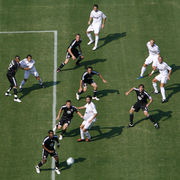
The MLS Best XI is an acknowledgment of the best eleven players in the league in a given season for Major League Soccer.[43]
- Marco Etcheverry: 1996, 1997, 1998, 1999
- Jeff Agoos: 1997, 1999
- Eddie Pope: 1997, 1998
- Jaime Moreno: 1997, 1999, 2004, 2005, 2006
- Ryan Nelsen: 2003, 2004
- Christian Gómez: 2005, 2006, 2007
- Troy Perkins: 2006
- Bobby Boswell: 2006
- Ben Olsen: 2007
- Luciano Emilio: 2007
Other awards
- Most Valuable Player: Marco Etcheverry, 1998; Christian Gomez, 2006; Luciano Emilio, 2007.
- Coach of the Year: Bruce Arena, 1997.
- Defender of the Year: Eddie Pope, 1997; Bobby Boswell, 2006.
- Goalkeeper of the Year: Troy Perkins, 2006.
- Golden Boot: Jaime Moreno, 1997; Luciano Emilio, 2007.
- Newcomer of the Year: Luciano Emilio, 2007.
- Rookie of the Year: Ben Olsen, 1998.
National Soccer Hall of Famers
- John Harkes, MF, 1996–1998, inducted 2005 (Player Category).
- Jeff Agoos, DF, 1996–2000, inducted 2009 (Player Category).
- Bruce Arena, coach, 1996–1998, inducted 2010 (Builder Category).
Hall of Tradition
In 2003, D.C. United introduced the "Hall of Tradition" (formerly "Tradition of Excellence"), an honor bestowed upon players, coaches & front office staff deemed by United to have been crucial to the team's success.[44]
- John Harkes, MF, 1996–1998, inducted May 14, 2003.
- Marco Etcheverry, MF, 1996–2003, inducted October 20, 2007.
- Betty D'Anjolell, executive, 1995–1998, inducted June 29, 2008.
- Jeff Agoos, DF, 1996–2000, inducted October 16, 2008.
- Raúl Díaz Arce, F, 1996–1997, 2000, inducted September 2, 2009
- Danilo Noel Dirón, Broadcaster, 1997–2008, inducted September 2, 2009
- Eddie Pope, DF, 1996–2002, inducted July 18, 2010.
Head coaches
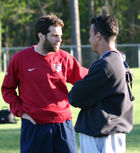
Seven head coaches have managed D.C. United in its history. Bruce Arena began in 1996, leaving his position coaching the men's soccer team at the University of Virginia. In 1998, after winning two MLS Cups and the 1996 U.S. Open Cup, Arena left to coach the United States men's national soccer team.[8] Thomas Rongen left his head coach position with the New England Revolution to replace Arena in 1999. Rongen led D.C. to another MLS cup in 1999 but was replaced by Ray Hudson in 2002, who was hired after the contraction of his Miami Fusion F.C. that year.[45]
Hudson saw D.C. United fall to last in the table in 2002 and lose in the first round of the playoffs in 2003.[46] Former Chicago Fire player Piotr (Peter) Nowak was then hired to replace Hudson, and led D.C. United to their fourth MLS Cup in 2004.[47] Nowak left on December 21, 2006 for an assistant coaching position on the U.S. men's national team. Tom Soehn, another former Chicago Fire player, was hired next, and was the first American to coach the team since Bruce Arena.[9] He left the team at the end of the 2009 season.[48] On December 28, 2009 D.C. hired former Kansas City Wizards manager Curt Onalfo as its sixth head coach.[49] On August 4, 2010, Onalfo was dismissed as head coach of D.C. United and Ben Olsen was named interim head coach.[50]
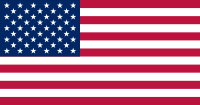 Bruce Arena (1996–1998)
Bruce Arena (1996–1998)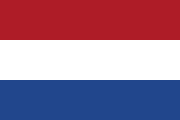 Thomas Rongen (1999–2001)
Thomas Rongen (1999–2001)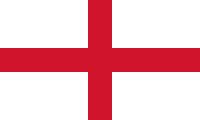 Ray Hudson (2002–2003)
Ray Hudson (2002–2003) Peter Nowak (2004–2006)
Peter Nowak (2004–2006) Tom Soehn (2007–2009)
Tom Soehn (2007–2009) Curt Onalfo (2010)
Curt Onalfo (2010) Ben Olsen (2010—Present)
Ben Olsen (2010—Present)
Statistics and records
- Games:
 Jaime Moreno, 308
Jaime Moreno, 308 - Goals:
 Jaime Moreno, 129 (Moreno also holds the league record with 131 MLS goals)
Jaime Moreno, 129 (Moreno also holds the league record with 131 MLS goals) - Assists:
 Jaime Moreno, 102
Jaime Moreno, 102 - Minutes:
 Jaime Moreno, 24,372
Jaime Moreno, 24,372 - Shots:
 Jaime Moreno, 660
Jaime Moreno, 660 - Shots on Goal:
 Jaime Moreno, 380
Jaime Moreno, 380 - Game-Winning Goals:
 Jaime Moreno, 26
Jaime Moreno, 26 - Penalty-Kick Goals:
 Jaime Moreno, 42
Jaime Moreno, 42 - Multi-Goal Games:
 Jaime Moreno, 17
Jaime Moreno, 17 - Hat Tricks:
 Raúl Díaz Arce, 2
Raúl Díaz Arce, 2 - Shutouts:
 Nick Rimando, 29
Nick Rimando, 29 - Saves:
 Nick Rimando, 355
Nick Rimando, 355 - Wins:
 Nick Rimando, 41
Nick Rimando, 41
Players in bold are active D.C. United players. Last Updated October 24, 2009[51]
- All-Time regular season record: 188-152-58 = .521 win % (Through 2008 season)
- All-Time regular season home record: 118-52-28 = .643 win % (Through 2008 season)
- All-Time regular season away record: 70-100-30 = .400 win % (Through 2008 season)
Achievements
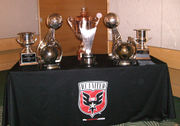
Domestic
- MLS Cup:
- Winners (4): 1996, 1997, 1999, 2004
- Runners-up (1): 1998
- MLS Supporters' Shield:
- Winners (4): 1997, 1999, 2006, 2007
- Runners-up (1): 1998
- U.S. Open Cup:
- Winners (2): 1996, 2008
- Runners-up (2): 1997, 2009
- Eastern Conference Playoff:
- Winners (7): 1996, 1997, 1998, 1999, 2004, 2006, 2007
- Eastern Conference Regular Season:
- Winners (5): 1997, 1998, 1999, 2006, 2007
International
- CONCACAF Champions' Cup:
- Winners (1): 1998
- Third place (3): 1997, 1999, 2007
- CONCACAF Giants Cup:
- Runners-up (1): 2001
- InterAmerican Cup:
- Winners (1): 1998
Other
- Carolina Challenge Cup (pre-season):
- Winners (1): 2010
- Runners-up (3): 2004, 2005, 2006
- MLS Reserve Division:
- Winners (1): 2005
Year-by-year
| Year | MLS Regular Season[52] | MLS Playoffs | U.S. Open Cup | CONCACAF Champions' League |
SuperLiga | ||
|---|---|---|---|---|---|---|---|
| Result | Average Attendance | Result | Average Attendance | ||||
| 1996 | 2nd, East | 15,262 | Champions | 18,946 | Champions | Did not enter | Started in 2007 |
| 1997 | 1st, East* | 16,698 | Champions | 20,202 | Final | Third Place | |
| 1998 | 1st, East | 16,008 | Final | 14,903 | Did not enter | Champions | |
| 1999 | 1st, East* | 17,419 | Champions | 12,647 | Round of 16 | Third Place | |
| 2000 | 4th, East | 18,580 | Did not qualify | Quarterfinals | Fourth Place | ||
| 2001 | 4th, East | 21,518 | Did not qualify | Semifinals | Not Held † | ||
| 2002 | 5th, East | 16,519 | Did not qualify | Did not enter | Round of 16 | ||
| 2003 | 4th, East | 15,565 | Quarterfinals | 15,202[53] | Semifinals | Did not qualify | |
| 2004 | 2nd, East | 17,232 | Champions | 18,842 | Round of 16 | Did not qualify | |
| 2005 | 2nd, East | 16,664 | Quarterfinals | 20,089[54] | Quarterfinals | Semifinals | |
| 2006 | 1st, East* | 18,215 | Semifinals | 20,504 | Semifinals | Did not qualify | |
| 2007 | 1st, East* | 20,967 | Quarterfinals | 19,438[55] | Round of 16 | Third Place | Semifinals |
| 2008 | 6th, East | 19,835 | Did not qualify | Champions | Semifinals | Group Stage | |
| 2009 | 4th, East | 16,088 | Did not qualify | Final | Group Stage | Did not qualify | |
| 2010 | Group Stage | Did not qualify | |||||
* Won MLS Supporters' Shield
† Finished runner-up in the CONCACAF Giants Cup that was held in 2001 instead of the CONCACAF Champions' Cup
References
- ↑ 1.0 1.1 Kravitz, Derek (June 18, 2009). "Fans Asked to Choose Where Team Should Find New Home". The Washington Post. http://www.washingtonpost.com/wp-dyn/content/article/2009/06/17/AR2009061703623.html. Retrieved July 9, 2009.
- ↑ 2.0 2.1 2.2 "Trophy Case". D.C. United. 2009. http://www.dcunited.com/history-tradition/trophy-case. Retrieved June 27, 2009.
- ↑ "SOCCER -- CONCACAF CUP; D.C. United Wins Tournament". The New York Times. August 17, 1998. http://query.nytimes.com/gst/fullpage.html?res=9B03E2DD163DF934A2575BC0A96E958260. Retrieved June 27, 2009.
- ↑ "D.C. United downs Vasco da Gama to take InterAmerican Cup". CNN/SI. December 7, 1998. http://sportsillustrated.cnn.com/soccer/news/1998/12/05/interamerican_cup/index.html. Retrieved June 27, 2009.
- ↑ Goff, Steven (July 30, 2005). "New United Investors Win Trust". The Washington Post. http://www.washingtonpost.com/wp-dyn/content/article/2005/07/29/AR2005072901752.html. Retrieved April 11, 2009.
- ↑ 6.0 6.1 "Football Culture. Names Explained". British Council Korea. Archived from the original on February 3, 2008. http://web.archive.org/web/20080203010544/http://www.britishcouncil.org/korea-sport-footballculture-names-explain-3.htm. Retrieved December 11, 2006.
- ↑ 7.0 7.1 7.2 7.3 7.4 "General Overview". Major League Soccer. 2009. Archived from the original on June 25, 2008. http://web.archive.org/web/20080625214719/http://web.mlsnet.com/about/. Retrieved June 26, 2009.
- ↑ 8.0 8.1 "America’s one and only United". FIFA. September 24, 2008. http://www.fifa.com/classicfootball/news/newsid=887744.html. Retrieved September 6, 2009.
- ↑ 9.0 9.1 9.2 9.3 "D.C. United Tradition". Major League Soccer. 2007. http://web.mlsnet.com/t103/load.jsp?section=about&content=tradition. Retrieved June 27, 2009.
- ↑ Wise, Mike (November 13, 2004). "Nowak Creates A United State". The Washington Post. http://www.washingtonpost.com/wp-dyn/articles/A46503-2004Nov12.html. Retrieved June 27, 2009.
- ↑ Dure, Beau (November 11, 2004). "Harkes keeps both feet in the soccer world". USA Today. http://www.usatoday.com/sports/soccer/2004-11-11-asked-harkes_x.htm. Retrieved June 19, 2007.
- ↑ Dell'Apa, Frank (July 26, 2005). "10 of the best... MLS games". ESPN. http://soccernet.espn.go.com/columns/story?id=337632&root=extratime&&cc=5901. Retrieved June 19, 2007.
- ↑ Goff, Steven (November 3, 2006). "Revolution Ready to Take Another Shot". The Washington Post. http://www.washingtonpost.com/wp-dyn/content/article/2006/11/02/AR2006110201524.html. Retrieved June 19, 2007.
- ↑ "D.C. United & Comcast SportsNet to launch 'Brunch with D.C. United'". Major League Soccer. http://web.mlsnet.com/news/team_news.jsp?ymd=20060125&content_id=51051&vkey=pr_dcu&fext=.jsp&team=dcu. Retrieved June 19, 2007.
- ↑ Lifton, David (May 11, 2005). "Looking back: Unforgettable in every way". Major League Soccer. Archived from the original on April 07, 2007. http://web.archive.org/web/20070407082306/http://web.mlsnet.com/news/team_news.jsp?ymd=20050511&content_id=29379&vkey=news_dcu&fext=.jsp&team=dcu. Retrieved June 19, 2007.
- ↑ Slater, Matt (November 22, 2006). "Doubts raised in US over Adu move". BBC News. http://news.bbc.co.uk/sport2/hi/football/teams/m/man_utd/6169400.stm. Retrieved June 27, 2009.
- ↑ "Ready for Freddy! Real Salt Lake acquires teen phenom Freddy Adu from D.C. United". mlsnet.com. December 11, 2006. http://real.saltlake.mlsnet.com/news/team_news.jsp?ymd=20061211&content_id=80226&vkey=pr_rsl&fext=.jsp&team=t121. Retrieved December 12, 2006.
- ↑ "United Ousted From Copa Sudamericana". The Washington Post. September 23, 2005. http://www.washingtonpost.com/wp-dyn/content/article/2005/09/22/AR2005092202000_pf.html. Retrieved June 27, 2009.
- ↑ Hicks, Doug. "D.C. United S.C.". FootballCrests.com. http://www.footballcrests.com/clubs/dc-united-sc. Retrieved June 6, 2009.
- ↑ Goff, Steven (April 26, 2005). "MLS Officials: United Played on Irregular Field". The Washington Post. http://www.washingtonpost.com/wp-dyn/articles/A16346-2005Apr26.html. Retrieved May 27, 2009.
- ↑ "D.C. United Academy Camps: Directions". D.C. United. 2009. Archived from the original on July 05, 2008. http://web.archive.org/web/20080705062241/http://dcunited.mlsnet.com/t103/camps/academy/directions/. Retrieved July 9, 2009.
- ↑ Nakamura, David (July 21, 2007). "Talks Fall Apart On Stadium for D.C. Soccer Team". The Washington Post. http://www.washingtonpost.com/wp-dyn/content/article/2007/07/20/AR2007072002470_pf.html. Retrieved September 6, 2009.
- ↑ Castro, Melissa (April 7, 2009). "Prince George's vote likely kills D.C. United stadium deal". Washington Business Journal. http://washington.bizjournals.com/washington/stories/2009/04/06/daily49.html.
- ↑ Bali, Rahul (May 9, 2009). "DC United fans march in support of new stadium". WTOP-FM. http://www.wtop.com/?nid=25&sid=1672763. Retrieved May 27, 2009.
- ↑ Van Valkenburg, Kevin; Mirabella, Lorraine (October 7, 2009). "Dixon eyeing soccer arena". The Baltimore Sun. http://www.baltimoresun.com/sports/blast/bal-sp.soccer07oct07,0,7674752.story. Retrieved October 22, 2009.
- ↑ http://articles.baltimoresun.com/2010-07-29/sports/bs-sp-soccer-stadium-0729-20100729_1_soccer-only-stadium-world-cup-manchester-city
- ↑ "About Us". La Barra Brava. December 24, 2007. Archived from the original on June 12, 2008. http://web.archive.org/web/20080612121323/http://www.barra-brava.com/index.php?option=com_content&task=view&id=12&Itemid=26. Retrieved June 6, 2009.
- ↑ Goode, Harlan (June 25, 2008). "In the trenches with soccer's craziest fans". The Washington Times. http://washingtontimes.com/news/2008/jun/25/united-they-stand/. Retrieved September 6, 2009.
- ↑ "About". La Norte. February 26, 2009. http://www.lanorte.com/About.html. Retrieved June 6, 2009.
- ↑ Krishnaiyer, Kartik (March 21, 2009). "The Rivalry That Defines MLS: Galaxy-DC United". MLS Talk. http://www.majorleaguesoccertalk.com/the-rivalry-that-defines-mls-galaxy-dc-united/2635. Retrieved June 6, 2009.
- ↑ Canales, Andrea (August 8, 2007). "MLS audiences continue to wait on Beckham". ESPNsoccernet. http://soccernet.espn.go.com/columns/story?id=451219&cc=5901. Retrieved June 6, 2009.
- ↑ "Battery set for Open Cup rematch with DC United". Charleston Battery. March 14, 2009. http://www.charlestonbattery.com/matches_previews.asp?cid=398. Retrieved June 6, 2009.
- ↑ Goff, Steven (October 12, 2000). "United's Ownership Uncertain; After Sale Fell Through, MLS Might Take Over Operation". The Washington Post. http://pqasb.pqarchiver.com/washingtonpost/access/62439758.html?dids=62439758:62439758&FMT=ABS&FMTS=ABS:FT&fmac=&date=Oct+12%2C+2000&author=Steven+Goff&desc=United%27s+Ownership+Uncertain%3B+After+Sale+Fell+Through%2C+MLS+Might+Take+Over+Operation. Retrieved June 6, 2009.
- ↑ "MacFarlane leads group in purchase of Major League Soccer's D.C. United". D.C. United Media Relations. January 8, 2007. Archived from the original on February 02, 2008. http://web.archive.org/web/20080202234540/http://web.mlsnet.com/news/team_news.jsp?ymd=20070108&content_id=81363&vkey=pr_dcu&fext=.jsp&team=t103. Retrieved June 27, 2009.
- ↑ Boehm, Charles. "Chang assumes control of DC United". Major League Soccer. http://web.mlsnet.com/news/mls_news.jsp?ymd=20090523&content_id=4901182&vkey=news_mls&fext=.jsp. Retrieved May 31, 2009.
- ↑ Goff, Steve (October 21, 2009). "DCU Ownership, Olsen, USA Friendlies". The Washington Post. http://voices.washingtonpost.com/soccerinsider/2009/10/dcu_and_usa.html. Retrieved October 22, 2009.
- ↑ Goff, Steven (May 6, 2008). "United Takes Volkswagen Out for a Spin". The Washington Post. http://www.washingtonpost.com/wp-dyn/content/article/2008/05/05/AR2008050502159.html. Retrieved June 27, 2009.
- ↑ "D.C. United Corporate Partners". D.C. United. 2009. http://dcunited.mlsnet.com/t103/load.jsp?section=about&content=sponsors. Retrieved June 6, 2009.
- ↑ "D.C. United enters into strategic partnership with Brazil's Clube Atlético Mineiro". D.C. United Media Relations. May 4, 2007. http://dcunited.mlsnet.com/news/team_news.jsp?ymd=20070504&content_id=92026&vkey=pr_dcu&fext=.jsp&team=t103. Retrieved June 27, 2009.
- ↑ "D.C. United, Comcast SportsNet announce broadcast schedule". Comcast SportsNet. March 4, 2008. http://comcastsportsnet.tv/pages/press_landing?3408---DC-United-Comcast-SportsNet-annou=1&blockID=4659&feedID=324. Retrieved June 27, 2009.
- ↑ "D.C. United to partner with La Nueva 87.7 FM for Spanish-language radio broadcasts". D.C. United. January 20, 2010. http://www.dcunited.com/press-release/dc-united-partner-la-nueva-877-fm-spanish-language-radio-broadcasts. Retrieved January 20, 2010.
- ↑ "First Team Roster". D.C. United. http://www.dcunited.com/club/first-team. Retrieved August 6, 2010.
- ↑ "Award Winners & All-Stars". D.C. United. 2009. http://www.dcunited.com/history-tradition/award-winners-all-stars. Retrieved June 30, 2009.
- ↑ "D.C. United: Fans: D.C. United Hall of Tradition". Major League Soccer. 2008. http://web.mlsnet.com/t103/fans/hall_of_tradition/. Retrieved June 27, 2009.
- ↑ Bell, Jack (January 9, 2002). "Major League Soccer Eliminates Two Teams". The New York Times. http://www.nytimes.com/2002/01/09/sports/soccer-major-league-soccer-eliminates-two-teams.html. Retrieved September 6, 2009.
- ↑ "United Declines Hudson Option". mlsnet.com. December 1, 2003. http://www.usenet.com/newsgroups/rec.sport.soccer/msg17916.html. Retrieved July 11, 2007.
- ↑ Connolly, Marc (January 8, 2004). "Newest coaches will be under pressure". ESPN Soccernet.com. http://soccernet.espn.go.com/columns/story?id=287909&root=mls&cc=5901. Retrieved September 6, 2009.
- ↑ "Soehn will not return to D.C. United". The Miami Herald. The Sports Network. November 3, 2009. http://www.miamiherald.com/sports/soccer/story/1313936.html. Retrieved November 3, 2009.
- ↑ Hansen, Drew (December 29, 2009). "Ex-D.C. player Onalfo named United's coach". The Washington Times. http://www.washingtontimes.com/news/2009/dec/29/former-player-onalfo-named-uniteds-coach/. Retrieved January 14, 2010.
- ↑ Goff, Steven (August 4, 2010). "D.C. United fires Coach Curt Onalfo". The Washington Post. http://voices.washingtonpost.com/soccerinsider/2010/08/dc_united_fires_curt_onalfo.html. Retrieved August 4, 2010.
- ↑ "D.C. United All-Time Leaders". Major League Soccer. August 22, 2009. Archived from the original on May 15, 2008. http://web.archive.org/web/20080515090256/http://web.mlsnet.com/mls/history/alltime_leaders.jsp?team=t103. Retrieved January 19, 2010.
- ↑ "MLS History". Major League Soccer. Archived from the original on January 19, 2008. http://web.archive.org/web/20080119131028/http://web.mlsnet.com/mls/history/index.jsp. Retrieved July 31, 2009.
- ↑ "2003 Results". Major League Soccer. http://web.mlsnet.com/schedule/results.jsp?team=t103&year=2003. Retrieved June 30, 2009.
- ↑ "MLS Cup Stats 2005". Major League Soccer. November 14, 2005. Archived from the original on December 30, 2007. http://web.archive.org/web/20071230024514/http://web.mlsnet.com/mls/events/mls_cup/2005/stats/index.jsp?club=mls. Retrieved June 30, 2009.
- ↑ Goff, Steven (November 2, 2007). "D.C. United Draws a Conclusion". The Washington Post. http://www.washingtonpost.com/wp-dyn/content/article/2007/11/01/AR2007110102630.html. Retrieved June 30, 2009.
External links
- www.dcunited.com Team's official website
- Team profile on FIFA.com
- Official D.C. United board courtesy of BigSoccer
Supporters
- www.barra-brava.com Barra Brava Supporters' Club
- www.screaming-eagles.com Screaming Eagles Supporters' Club website
- www.lanorte.com La Norte Supporters' Club
- dcunited.pl Polish fan website
Blogs
|
|||||||||||||||||||||||||||||||||||||||||||||||
|
||||||||||||||||||||||||||||
|
||||||||||||||||||||
|
|||||||||||||||||||||||
|
|||||||||||||||||||||||||||||

